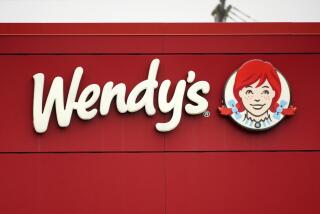Sales are smokin’ at Downey BBQ grill maker Lynx

Lynx Professional Grills of Downey needed to move into a new 125,000-square-foot factory to keep up with the blistering pace of business. Pretty remarkable, considering the grills cost $1,750 to $7,700.
Among the hundreds of gadgets, games and apps at January’s Consumer Electronics Show, few had the sizzle of James Buch’s gleaming silver hunk of hardware.
That’s because the device is a barbecue grill — one that’s Wi-Fi enabled, voice activated and chatty in a Siri-ish way.
“When the Lynx Smart Grill is ready for the food, it sends you a text,” said Buch, chief executive of Lynx Professional Grills of Downey. “When it’s time to flip the food, it sends you a text. When the food is ready, it sends you a text.”
The smart grill, which features an online collection of recipes that adapt to a griller’s preferences, won’t begin selling until next year. All tricked out, the concept grill is expected to retail for about $8,000, which isn’t much higher than the company’s current top-priced non-talking product.
In an industry still struggling to recover from recession-induced consumer frugality, Lynx has been keeping plenty busy manufacturing hand-assembled grills and outdoor kitchens for cooks with lots of cash.
Lynx has been making outdoor grills for 18 years, but lately the company has been on fire, reaching nearly $50 million in revenue last year.
“We had a record year for sales in 2013,” Buch said, “and we’re already heading to be 25% ahead of that in 2014. We’re really in acceleration mode right now.”
Lynx recently moved into a bigger factory, hired 25 more workers and is up to 150 employees. The company could hire as many as 50 more workers in the next three months to keep up with demand, Buch said.
The outdoor cooking industry hasn’t fared nearly as well.
In 2013, 13.9 million barbecue grills and smoking cookers were shipped in North America, the worst showing in 15 years, according to the Hearth, Patio & Barbecue Assn.
But the affluent customer is fueling what industry watchers think is a comeback.
“Anecdotally, we are seeing some outstanding high-end market growth numbers,” said Don Johnson, director of market research for the Hearth, Patio & Barbecue Assn. “And Lynx is a very high-end grill.”
The consumer with money to burn is Lynx’s focus, with grills that cost from $1,750 to $7,700 for the most accessorized of outdoor kitchens.
“Our professional series grills are for people who are putting together a custom outdoor kitchen, where the outside has been transformed into an extension of the indoor living space,” Buch said. “This would typically be a household income north of $250,000.”
Daniel and Lisa Levin bought a Lynx grill for the 4,000-square-foot Manhattan Beach dream house they built 11 years ago.
Within the last year, the Levins added an outdoor fountain, outdoor refrigerator and fire pit. To go with it, they bought a Lynx grill that starts — without extras — around $5,100, with a 36-inch cooking surface.
“I love my Lynx,” said Daniel Levin, 49, who works in talent management and licensing for the entertainment industry. Lisa Levin is a real estate agent who considers the grill a good investment.
“We’re certainly feeling much better about the economy and about investing the dollars into our real estate,” he said.
Lynx began 30 years ago as the Bar Equipment Corp. of America, making commercial restaurant and bar equipment, Buch said. The company was renamed Lynx in 1996, after it made its first outdoor grill for residential use and began to phase out commercial equipment.
“I’m told they picked the name Lynx because they have an uncanny sense of smell and taste,” Buch said.
Lynx has been owned by an El Segundo-based private equity firm, Century Park Capital Partners, since 2006.
Buch came onboard as chief executive in September 2012 with a mandate to boost sales.
Buch is a kind of corporate surgeon; he has been repairing one company or another for the last 33 years.
“I try not to do the same industry two times in a row,” he said, “because I like the challenge of going into a new kind of competition.”
Buch knew Lynx needed to build products that appealed to new customers, including women. The Lynx website, for instance, highlights the company’s “Mom friendly easy to lift Lynx Hood Assist,” which rises with a push of a single finger. (The grill-buying decision is made by men 69% of the time, according to the Hearth, Patio & Barbecue Assn.)
“If you are going to craft a growth strategy in today’s economy, you are going to have to take market share,” Buch said.
To accommodate the company’s growth, Lynx moved last year to Downey from Commerce and into a new factory that at 120,000 square feet is nearly double the size of its old facility.
The new factory “was designed for more efficient manufacturing,” Buch said. The changes included a $750,000 state-of-the-art laser metal cutter.
“The laser head can move at 4,000 inches a minute and it requires zero setup time,” Buch said. “This has helped give us a 400% increase in production capacity.”
Instead of making 20 to 40 grills a day, Buch said, “here, we can run double that on a single shift, with the same basic manpower.”
Each Lynx grill starts as a single sheet of high-grade steel. First, the laser cuts various parts in a way that maximizes the surface area used and minimizes waste, much in the same way a designer jeans manufacturer cuts denim fabric.
Next, workers at “brake” machines bend the sheet metal into the right configurations.
From there, the parts are hand-welded into components, such as the fireboxes that hold the brass burners and, by extension, the cooking heat. Next, workers grind and polish the metal connections down to such a fine mirror surface that it again looks like a single piece of metal.
The final addition is the electrical wiring for things such as the lighting and the ignition system. Next the grills, which operate on natural gas or propane, are tested.
Lynx also sells accessories such as outdoor refrigerators and patio heaters. Lynx products can be found at chain stores such as Home Depot as well as specialty retailers.
Buch said the smart grill technology, which adds $1,200 to $1,500 in costs, could be added to other grills the company makes.
“Like any technology, it’s all about volume. The more you sell, the more affordable it becomes,” he said.
Some purists aren’t pleased by gas grilling with built-in back-and-forth.
At Phillips Bar-B-Que on Crenshaw Boulevard, where televised soap operas recently entertained lunchtime customers, manager Sabrina Wilson saw Lynx’s talking grill as an example of how custom wood-smoked barbecuing is “almost a lost art.”
On the other hand, Wilson quipped, “if the grill is going to cost that much, it better do what I tell it to do.”
Twitter: @RonDWhite







